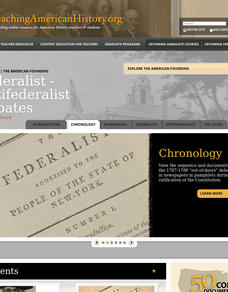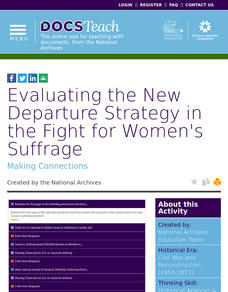Teach Engineering
Surface Tension Lab
What constitutes a good soap bubble? In the second installment of a nine-part series, scholars apply their understanding of surface tension to soap bubbles. They experiment to determine the best solutions to use for the...
EngageNY
Fair Games
What constitutes a fair game? Scholars learn about fair games and analyze some to see if they are fair. They extend this idea to warranties and other contexts.
State Bar of Texas
Marbury v. Madison
Who has the final say in matters dealing with the rules under the United States Constitution? The case Marbury v. Madison brings to light the issue of judicial review. Learners investigate the Supreme Court's opinion in the case with a...
iCivics
Mini-Lesson: Executive Orders
Can the President of the United States pass a law all by himself? Scholars investigate the concept of the executive order in regards to the powers of the presidency. They use current issues and events to monitor media bias while also...
Ashbrook Center at Ashland University
Federalist - Antifederalist Debates
Who should have the power—individual states or the federal government? Scholars research the arguments of the Federalists and Anti-Federalists during the formation of the United States Constitution. Online resources, including a vast...
National Constitution Center
AP English Language—Precision of Language
Say what you mean and mean what you say. The Precision of Language addresses the importance of words, especially when they concern a person's rights. Scholars take a look at many different examples and complete questions analyzing the...
Judicial Learning Center
The Bill of Rights and Civil Liberties
Why is the Bill of Rights so important to American's civil liberties? An important resource helps scholars find these answers and more by reading through state and federal constitutions to discover their own civil liberties. The activity...
New York State Education Department
US History and Government Examination: August 2016
Multiple-choice and essay questions test comprehension, writing ability, and skills with primary source analysis. The comprehensive exam covers many different subjects including the United States census, Constitution, and important...
ProCon
Gun Control
According to some estimates, there are more guns than people in the United States. Learners decide if America should enact more gun control laws. They analyze information about gun deaths in the United States by year, read about the...
National Woman's History Museum
The National Woman’s Party
Two parties led the women's suffrage movement. The National American Woman Suffrage Association (NAWSA) was a moderate organization while the National Women's Party (NWP) was more militant. Young historians investigate why members of the...
Eau Claire Area School District
Intellectual Property Lesson Plans
Fair use, intellectual property, public domain ... what does it all mean? Scholars act as judges to determine if different scenarios constitute fair use. They also advance their research skills by practicing paraphrasing and citing...
EngageNY
Studying Conflicting Interpretations: Perspectives on Plessy v. Ferguson: Part 3
Scholars closely read Justice John Marshall Harlan's dissenting opinion in the Plessy v. Ferguson case, seeking to understand why he disagreed with the court's decision that racial segregation laws for public spaces were constitutional....
Curated OER
Post-1865: Effects of the War
An engaging lesson focuses on the impact of the war and Lincoln's plan for Reconstruction had on the United States. Historians analyze primary documents, such as Constitutional Amendments and newspaper experts. They also participate in...
Teaching Tolerance
Using Photographs to Teach Social Justice | Confronting Unjust Laws
The right to peacefully assembly to protest injustice is a key element of the First Amendment to the United States Constitution. Class members are asked to analyze two photographs of people confronting what they consider to be unjust...
Encyclopedia Britannica
Presidential Electability
There are specific constitutional requirements that candidates must meet to become president of the United States. In addition, there are societal opinions that affect a candidate's electability. Class members examine historical...
C-SPAN
Supreme Court Justices Research and Resumes
According to Article III, Section1 of the United States constitution, the only qualification one needs to be appointed to the Supreme Court is to demonstrate "good behavior." The president and Congress are given the power to determine...
Facing History and Ourselves
Interracial Democracy
Radical Reconstruction, the 10-year period referred to after Congress passed the Reconstruction Act of 1867, saw the establishment of manhood suffrage, men voting without any racial qualifications. Southern states also rewrote their...
National Endowment for the Humanities
“From Time to Time”: Presidents and Communicating with the Public
While the Constitution requires a "State of the Union" address, it doesn't give many details. In fact, it wasn't until Woodrow Wilson that the periodic update to Congress was given in-person. Using primary sources, recordings and...
DocsTeach
Evaluating the New Departure Strategy in the Fight for Women's Suffrage
When women demanded their right to vote, did the Constitution already protect it? The New Departure Strategy in the women's suffrage movement made this claim through court hearings. Using documents, such as transcripts from Susan B....
Museum of the American Revolution
Hamilton Was Here: Rising Up in Revolutionary Philadelphia
Hamilton may be a hit Broadway show, but there is so much more to learn. An eight-unit resource guides young historians through the life of Alexander Hamilton and the Revolutionary War. The lessons include hands-on-activities, writing,...
Center for History Education
Nineteenth Century Reform Movements: Women's Rights
It's hard to imagine a world where women were marginalized from the seats of power. Yet, there are women today who remember what it was like to not be allowed to vote. Using a DBQ of images and other primary sources, such as political...
Center for History Education
Speaking Freely In the Soviet Union's Autocratic Government
Speak your mind! The lesson explores the difference in free speech between the United States and the Soviet Union. Academics review the constitutions of both governments, political cartoons, and case studies to understand how freedom of...
Curated OER
The First (and Last) Words
What does "freedom of speech" mean to your class, especially in the context of Internet communications? In round-table discussion format, middle and high schoolers address the issues discussed in "State Legislatures Across U.S. Plan to...
Close Up Foundation
Rights Auction
In an engaging activity on universal and unalienable rights, learners work in groups to establish a democratic nation and determine what principles they want to protect to ensure a democratic society. They conduct a "rights auction" in...
Other popular searches
- Constitutional Convention
- Constitution Week
- Us Constitution
- U.s. Constitution
- Constitution History
- Constitution United States
- Constitutional Law
- Constitution Day
- The Constitution
- Constitutional Amendments
- Constitution Lessons
- Constitution Readers Theater

























